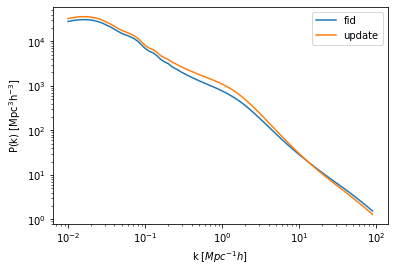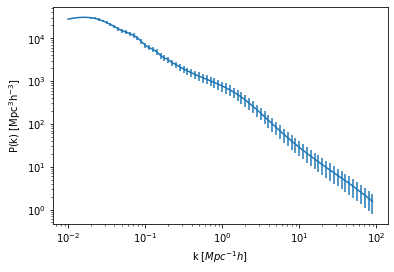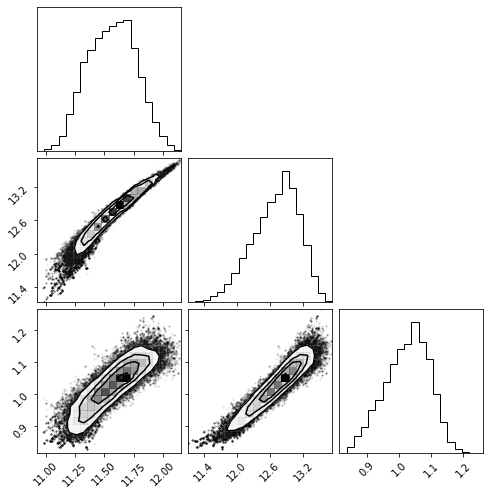Parameter Constraints with halomod¶
In this tutorial, parameters of a minimal galaxy HOD are fitted against power spectrum created using halomod with some error bars
For auto-power spectrum, all parameters and related calculation can be done using TracerHaloModel. Parameters can be easily updated through update, which makes it very easy to combine with data fitting tools. Here we use emcee as an example.
Let’s import those (and a few other things we’ll need):
[1]:
%matplotlib inline
import matplotlib.pyplot as plt
import numpy as np
from halomod import TracerHaloModel
import halomod
import hmf
import emcee
import scipy
from multiprocessing import Pool
import corner
[2]:
print("halomod version: ", halomod.__version__)
print("hmf version:", hmf.__version__)
halomod version: 1.4.6.dev71+gaca1ec0
hmf version: 3.1.0
Setting up TracerHaloModel¶
As a simplistic example, we’ll be using a Zehavi05 model which is simply:
which can be specified by hod_model and hod_params arguments:
[3]:
hm_fid = TracerHaloModel(hod_model='Zehavi05',hod_params=dict(
{"M_min": 11.6222, "M_1": 12.851, "alpha": 1.049}
))
hm = TracerHaloModel(hod_model='Zehavi05',hod_params=dict(
{"M_min": 11.6222, "M_1": 12.851, "alpha": 1.049}
))
And we’ve set up our HOD. You can easily update the parameter values:
[4]:
hm.update(hod_params=dict(
{"M_min": 11.6222, "M_1": 12.851, "alpha": 1.149}))
Compare it with the fiducial power spectrum to check the update:
[5]:
plt.plot(hm_fid.k_hm, hm_fid.power_auto_tracer,label='fid')
plt.plot(hm.k_hm, hm.power_auto_tracer,label='update')
plt.xscale('log')
plt.yscale('log')
plt.xlabel("k [$Mpc^{-1} h$]")
plt.ylabel(r"$\rm P(k) \ [{\rm Mpc^3}h^{-3}]$")
plt.legend(loc="upper right");
/home/ztchen/work/gitproject/halomod/src/halomod/tools.py:534: RuntimeWarning: divide by zero encountered in true_divide
norm = self._spl(match_x) / fnc(match_x)
/home/ztchen/work/gitproject/halomod/src/halomod/tools.py:534: RuntimeWarning: divide by zero encountered in true_divide
norm = self._spl(match_x) / fnc(match_x)

Just like that, we’re all set.
MCMC-Fitting¶
For a naive first-look, let’s create some fake error bar:
[6]:
pkerr = np.linspace(0.01,0.5,num=80)*hm_fid.power_auto_tracer
[7]:
plt.errorbar(hm_fid.k_hm, hm_fid.power_auto_tracer,yerr= pkerr)
plt.xscale('log')
plt.yscale('log')
plt.xlabel("k [$Mpc^{-1} h$]")
plt.ylabel(r"$\rm P(k) \ [{\rm Mpc^3}h^{-3}]$");

And construct a simple Gaussian likelihood function with flat prior:
[8]:
def autopower(theta,k):
hm.update(hod_params=theta)
pk=scipy.interpolate.interp1d(hm.k_hm,hm.power_auto_tracer)
return pk(k)
def lnprior_flat(params):
if params[0]>9.00 and params[0]<13.00 and params[1]<16.00 and params[1]>9.00 \
and params[2]<4 and params[2]>0:
return 0.0
else:
return -np.inf
def log_likelihood_flat(params, x,y,yerr):
theta=dict({"M_min": params[0], "M_1": params[1], "alpha": params[2]})
yfit= autopower(theta,x)
lp = lnprior_flat(params)
return lp - 0.5 * np.sum(((y-yfit)/yerr)**2)
Test against the fiducial values:
[9]:
pars = [11.6222, 12.851, 1.049]
print(log_likelihood_flat(pars,hm_fid.k_hm,hm_fid.power_auto_tracer,pkerr))
0.0
/home/ztchen/work/gitproject/halomod/src/halomod/tools.py:534: RuntimeWarning: divide by zero encountered in true_divide
norm = self._spl(match_x) / fnc(match_x)
Just for a taste of it, let’s run the mcmc with 100 walkers and 1000 steps:
[10]:
pars= np.array([11.6222, 12.851, 1.049])
ndim,nwalkers = 3,100
pos = [pars+1e-2*np.random.uniform(0,1,ndim)*pars for i in range(nwalkers)]
with Pool() as pool:
sampler = emcee.EnsembleSampler(nwalkers, ndim, log_likelihood_flat, \
args=(hm_fid.k_hm,hm_fid.power_auto_tracer,pkerr),pool=pool)
#start = time.time()
sampler.run_mcmc(pos, 1000, progress=True)
#end = time.time()
#multi_time = end - start
#print("Multiprocessing took {0:.1f} seconds".format(multi_time))
100%|██████████| 1000/1000 [20:45<00:00, 1.25s/it]
Getting the chains and extracting posterior:
[11]:
samples = sampler.get_chain().reshape((-1,3))
[17]:
mmin,m1,alpha = map(lambda v: (v[1],v[2]-v[1],v[1]-v[0]),\
zip(*np.percentile((samples),[16,50,84],axis=0)))
The 1-d confidence interval:
[18]:
print(mmin)
print(m1)
print(alpha)
[18]:
(11.569923415144125, 0.20428071115065016, 0.22297037607466308)
And the posterior distribution as a corner plot:
[25]:
fig = corner.corner(samples);

Constraining derived parameters¶
Notice that halomod provides a large pool of tools to calculate various quantities of potential interest, making it easier to perform posterior analysis on some parameters derived from your choice of halo model. For example, let’s rewrite the likelihood function to add a blob containing galaxy number density(mean_tracer_den) and linear galaxy bias(bias_effective_tracer):
[8]:
def autopower(theta,k):
hm.update(hod_params=theta)
pk=scipy.interpolate.interp1d(hm.k_hm,hm.power_auto_tracer)
return pk(k), np.array([hm.mean_tracer_den,hm.bias_effective_tracer])
def lnprior_flat(params):
if params[0]>9.00 and params[0]<13.00 and params[1]<16.00 and params[1]>9.00 \
and params[2]<4 and params[2]>0:
return 0.0
else:
return -np.inf
def log_likelihood_flat(params, x,y,yerr):
theta=dict({"M_min": params[0], "M_1": params[1], "alpha": params[2]})
yfit, arr= autopower(theta,x)
lp = lnprior_flat(params)
return lp - 0.5 * np.sum(((y-yfit)/yerr)**2),arr
Now the likelihood function also returns the blob:
[9]:
pars = [11.6222, 12.851, 1.049]
print(log_likelihood_flat(pars,hm_fid.k_hm,hm_fid.power_auto_tracer,pkerr))
(0.0, array([0.01495764, 1.11274361]))
/home/ztchen/work/gitproject/halomod/src/halomod/tools.py:534: RuntimeWarning: divide by zero encountered in true_divide
norm = self._spl(match_x) / fnc(match_x)
Rerun the same fitting:
[10]:
pars= np.array([11.6222, 12.851, 1.049])
ndim,nwalkers = 3,100
pos = [pars+1e-2*np.random.uniform(0,1,ndim)*pars for i in range(nwalkers)]
with Pool() as pool:
sampler = emcee.EnsembleSampler(nwalkers, ndim, log_likelihood_flat, \
args=(hm_fid.k_hm,hm_fid.power_auto_tracer,pkerr),pool=pool)
#start = time.time()
sampler.run_mcmc(pos, 1000, progress=True)
#end = time.time()
#multi_time = end - start
#print("Multiprocessing took {0:.1f} seconds".format(multi_time))
100%|██████████| 1000/1000 [20:52<00:00, 1.25s/it]
Extracting the blob:
[12]:
blob = sampler.get_blobs().reshape((-1,2))
[13]:
ng,b0 = map(lambda v: (v[1],v[2]-v[1],v[1]-v[0]),\
zip(*np.percentile((blob),[16,50,84],axis=0)))
The 1\(\sigma\) confidence interval is:
[14]:
print(ng)
print(b0)
(0.01652902170349346, 0.018470496973996536, 0.006735292723657369)
(1.112664171509334, 0.0038656722599357263, 0.003738854055712615)